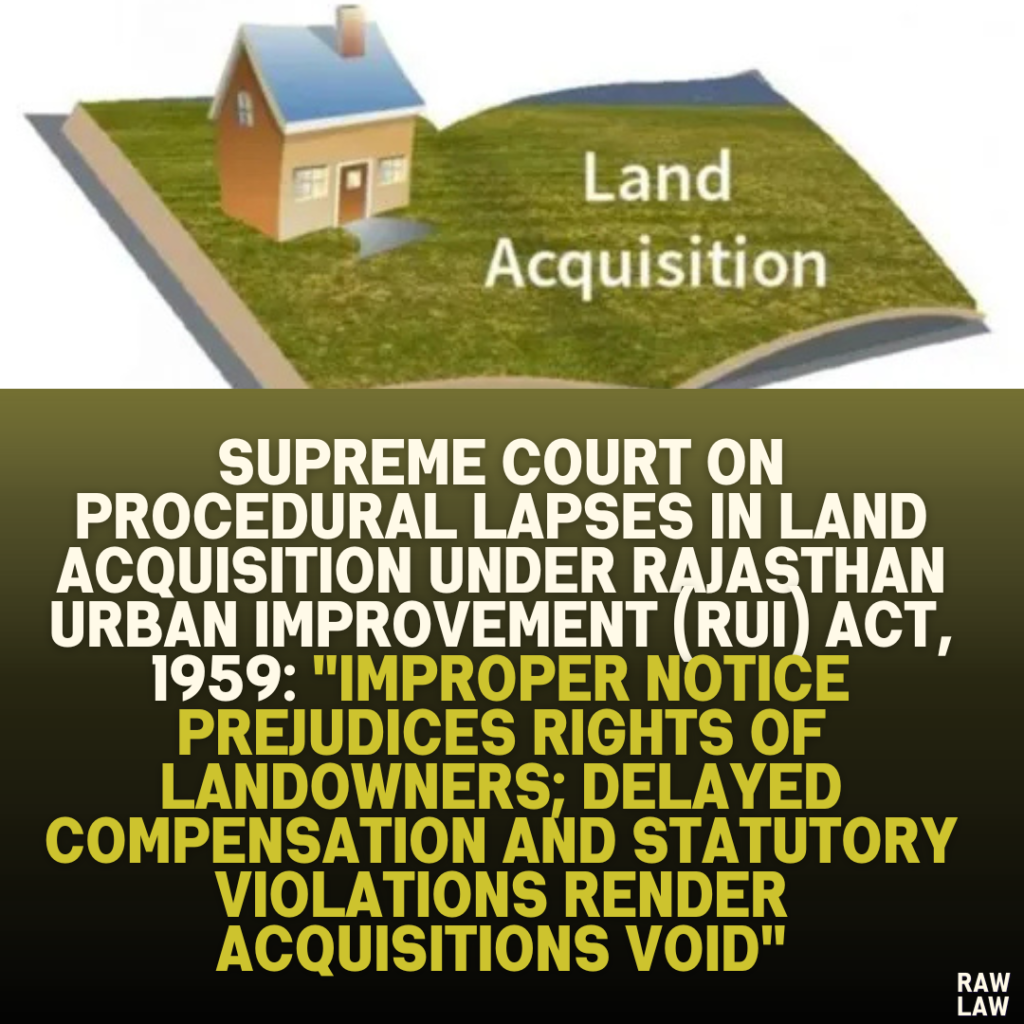Court’s Decision
The Supreme Court examined the legality of land acquisition under the Rajasthan Urban Improvement (RUI) Act, 1959. It addressed several procedural lapses concerning notice issuance, compensation payment timelines, and compliance with statutory safeguards. The Court upheld the High Court’s findings in part, invalidating certain acquisitions while allowing others based on the evidence of procedural compliance. The judgment emphasized the importance of adhering to statutory requirements to protect landowners’ constitutional rights.
Detailed Breakdown
Facts
The appeals arose from a common High Court judgment that quashed land acquisition proceedings initiated under the RUI Act. The State Government and the Urban Improvement Trust issued notifications for acquiring parcels of land under Section 52 of the RUI Act in 1976 and 1977. Two significant parcels were under dispute:
- Nangli Kota Lands: Initially owned by Ram Narain and inherited by his heirs. Compensation was determined at ₹90,000, but payment and possession transfers faced delays.
- Moongaska Lands: Purchased by multiple landowners but subjected to disputes over possession and ownership records.
Key procedural issues included:
- Proper notice issuance under Section 52(2) of the RUI Act.
- Determination and payment of compensation within statutory timelines under Section 60A, introduced via amendments in 1987.
- Alleged lapses in procedural compliance, including delayed awards and improper possession transfers.
Issues for Determination
- Whether delay and laches barred the landowners from challenging acquisition proceedings.
- Whether the notifications under Section 52(1) were valid given procedural irregularities in notice issuance under Section 52(2).
- Whether the compensation was lawfully determined and paid.
- Whether statutory timelines under Section 60A(3) and 60A(4) were mandatory to ensure valid acquisition.
- Whether improper notice service prejudiced the rights of landowners.
Petitioner’s Arguments
- Compliance with Notice Requirements: The petitioners argued that although individual notices were not served, constructive notice was provided through publication in the official gazette, and landowners actively participated in proceedings.
- Delay in Filing Writs: The petitioners contended that the landowners approached the court after a 21-year delay, rendering their claims barred by laches.
- Compensation Determination: Compensation was determined and deposited, fulfilling statutory obligations under the RUI Act.
- Public Interest: The acquisitions aimed at implementing public welfare schemes, and procedural deviations should not invalidate them.
Respondent’s Arguments
- Improper Notice Service: The respondents claimed that individual notices required under Section 52(2) were not served, depriving landowners of an opportunity to object.
- Failure to Pay Compensation: Compensation was neither timely determined nor paid, violating mandatory timelines under Section 60A.
- Invalid Acquisitions: Procedural lapses, including delayed awards and improper possession, rendered the acquisitions invalid.
- Unlawful Possession: The government and trust took possession without fulfilling statutory prerequisites, including payment of compensation.
Analysis of the Law
1. Delay and Laches
The Court acknowledged the 21-year delay but emphasized that procedural violations and constitutional rights, particularly the right to property, cannot be brushed aside on technical grounds. Citing precedents, it held that exceptional cases warrant condoning delays to prevent injustice.
2. Notice Under Section 52(2)
The Court noted that Section 52(2) required:
- Individual notices to landowners.
- Publication in the official gazette.
- Pasting the notice in a conspicuous locality.
The State failed to serve individual notices or paste notices in conspicuous areas. However, for the Nangli Kota lands, evidence of participation by landowners indicated constructive notice, which sufficed. For the Moongaska lands, non-participation by some landowners indicated prejudice, rendering the acquisition invalid.
3. Compensation Under Section 60A
- Subsection (3): Awards must be passed within one or two years of the amendment’s commencement in 1987.
- Subsection (4): 80% compensation must be paid within six months of the amendment.
The Court found that the State and Trust failed to comply with these provisions. Compensation was delayed, with amounts deposited years after the stipulated timelines, violating mandatory requirements.
4. Public Interest vs. Procedural Compliance
The Court emphasized that public interest does not override statutory safeguards meant to protect landowners’ rights. Procedural lapses, particularly those prejudicing landowners’ rights, cannot be excused.
Precedent Analysis
The Court relied on:
- Vidya Devi v. State of Himachal Pradesh (2020): Condonation of delay is warranted in cases of continuing injustice.
- Special Deputy Collector v. Sivaprakasam (2011): Constructive notice suffices when landowners are aware of acquisition proceedings.
- Kolkata Municipal Corporation v. Bimal Kumar Shah (2024): Procedural safeguards in compulsory acquisition ensure fairness and prevent arbitrariness.
Court’s Reasoning
- Nangli Kota Lands: Participation by landowners demonstrated constructive notice. The Court upheld the acquisition, notwithstanding procedural deviations in notice service.
- Moongaska Lands: Lack of participation by some landowners indicated improper notice. Combined with delayed compensation, the Court invalidated the acquisition.
Conclusion
- Notifications for Nangli Kota lands were upheld based on constructive notice and implied participation.
- Notifications for Moongaska lands were invalidated due to procedural lapses, including improper notice and delayed compensation.
Implications
The judgment underscores the importance of procedural compliance in land acquisition. It highlights the balance between public interest and individual rights, emphasizing that statutory safeguards must be strictly followed to ensure fairness and equity.



